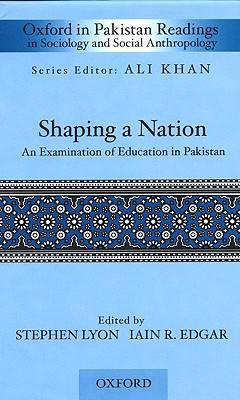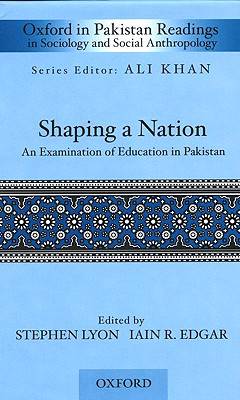
- Retrait gratuit dans votre magasin Club
- 7.000.000 titres dans notre catalogue
- Payer en toute sécurité
- Toujours un magasin près de chez vous
- Retrait gratuit dans votre magasin Club
- 7.000.000 titres dans notre catalogue
- Payer en toute sécurité
- Toujours un magasin près de chez vous
Shaping a Nation
An Examination of Education in Pakistan
19,95 €
+ 39 points
Description
Education is the key to transforming a society and Shaping a Nation is particularly pertinent because of the use and misuse of education in Pakistan. The contributors support efforts at widening access to formal education but recognize that education has consequences and that while some, perhaps most, are beneficial, others can be highly damaging. Thus, while literacy in Pakistan has slowly but steadily improved, there has been a corresponding increase in social fragmentation and dissatisfaction. To illustrate their viewpoints, the contributors examine the profound impact of General Zia's Islamization programs in the 1980s, which continue to shape the scope of what is possible within formal education. The authors also examine the wide rift between the various state-funded and private schooling opportunities. State-funded education currently lags behind the UN Millennium Development Goals and this inadequate provision has left a vacuum for other groups to move in and introduce rival agendas. All of the contributions focus on particular aspects of education across Pakistan. They identify a number of the issues involved in providing high quality mass education, including the language of instruction, source of financing, nationalist and religious agendas embedded within the curricula, gender role expectations, and historical legacies which have shaped the educational environment. Nestled in amongst the complex issues are examples of high quality education and dedicated educationalists who achieve daily miracles. Thus, Shaping a Nation portrays a range of views on how education in Pakistan is, what it could be, and perhaps most importantly what it ought to be.
Spécifications
Parties prenantes
- Editeur:
Contenu
- Nombre de pages :
- 350
- Langue:
- Anglais
- Collection :
Caractéristiques
- EAN:
- 9780195477092
- Date de parution :
- 28-06-10
- Format:
- Livre relié
- Format numérique:
- Genaaid
- Dimensions :
- 224 mm x 147 mm
- Poids :
- 544 g






